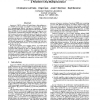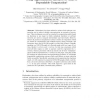936 search results - page 162 / 188 » Fault tolerant mechanism design |
VLSID
2001
IEEE
14 years 11 months ago
2001
IEEE
In this paper, we propose a new transparent built-in self-test ( TBIST ) method to test multiple embedded memory arrays with various sizes in parallel. First, a new transparent tes...
DSN
2007
IEEE
14 years 5 months ago
2007
IEEE
Aggressive CMOS scaling will make future chip multiprocessors (CMPs) increasingly susceptible to transient faults, hard errors, manufacturing defects, and process variations. Exis...
INFOCOM
2005
IEEE
14 years 4 months ago
2005
IEEE
Abstract— An ad hoc wireless network is an autonomous selforganizing system of mobile nodes connected by wireless links where nodes not in direct range communicate via intermedia...
RANDOM
1998
Springer
14 years 3 months ago
1998
Springer
Abstract. Redundancy has been utilized to achieve fault tolerant computation and to achieve reliable communication in networks of processors. These techniques can only be extended ...
ISCA
2011
IEEE
13 years 2 months ago
2011
IEEE
As we move to large manycores, the hardware-based global checkpointing schemes that have been proposed for small shared-memory machines do not scale. Scalability barriers include ...


